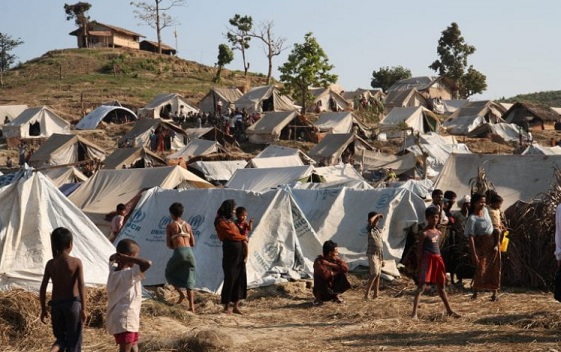Special to WorldTribune.com
 By John J. Metzler, October 12, 2025
By John J. Metzler, October 12, 2025
Almost a decade ago, the then new UN Sec. Gen. Antonio Guterres decried the forced expulsion of the minority Rohingya people from Myanmar (Burma) by the military.
During a September press conference in 2017, he condemned the Myanmar regime’s actions forcing nearly a million Muslim minority from the predominantly Buddhist Burma and into neighboring Bangladesh.
Fast forward to 2025.
Antonio Guterres, with only a year left in his tenure as Secretary General, opened a special UN Assembly Session, “High Level Conference on the Situation of Human Rights of Rohingya and other Minorities in Myanmar.”
He warned, “Minorities in Myanmar have endured decades of exclusion, abuse and violence. The Rohingya have been stripped of their right to citizenship. Terrorized with deadly force and destruction.” He stressed, “More than a million have sought refuge in Bangladesh.”
This has all been part of a sordid political tale of repression, ethnic cleansing and religious intolerance by Myanmar’s Beijing-backed military rulers.

In recent months the Texas-sized Southeast Asian country has additionally faced a severe earthquake, widening conflict and humanitarian challenges.
Julie Bishop, a former Australian Foreign Minister serving as the UN’s Special Envoy on Myanmar has made a number of visits to the beleaguered country to speak with the military government, the democratic opposition, and all levels of displaced Rohingya refugees. She has equally interfaced with members of the Association of South East Asian Nations, (ASEAN) a regional political forum which has been at loggerheads trying to solve the enduring political crisis.
Bishop stated, “A zero-sum mentality persists across this highly polarized nation.” She added, “Over 4 1/2 years since the military takeover, the fighting has been intense and the military has lost territory to ethnic armed organizations and others,” Nonetheless the military junta has now proclaimed it would surprisingly go ahead with elections later this year in parts of the vast country.
Between 1962 and 2011, the powerful military, the Tatmadaw, ran Burma with an iron fist.
Gen. Ne Win seized and held power for the next twenty-six years. He instituted the “Burmese Way to Socialism” which nationalized industries and turned Burma into an isolationist regime.
Only in 2012 did the political winds favor a more open system begging to rejoin Southeast Asia’s economic prosperity. For one hopeful but nervous decade longtime human rights activist Aung San Suu Kyi and her National League for Democracy brought the country some semblance of normalcy.
For decades, Myanmar’s Nobel Laureate Aung San Suu Kyi, who was imprisoned under the military, remained a beacon of hope.
That began to unravel with the Rohingya crisis in 2017 and the subsequent Beijing-backed military coup in 2021.
But during the period of quasi-openness, Aung San Suu Kyi tried to pacify the military by defending its abuses against the Rohingya and by restricting press freedoms. The once heralded “Angel of Democracy” fell into political disrepute.
Myanmar, a resource rich land, borders China and offers Beijing a window on the Bay of Bengal facing India. Myanmar moreover plays a key socio/economic role in China’s “Belt and Road Initiative (BRI) which links the Chinese Mainland to newly constructed seaports, railroads and infrastructure in the Southeast Asian state.
According to Commissioner Filippo Grandi of the UN High Commission for Refugees (UNHCR) “The Rohingya people have faced challenges for a long time. Eight years ago, confronted with unspeakable violence at the hands of Myanmar’s military, 750 thousand fled to Bangladesh. Others remained displaced in Rakhine State.” The refugee numbers would later expand.
Now with the advances of the Arakan Army, an ethnic opposition force which now controls almost all the Rakine state is fighting both the regime and intimidating Rohingya villagers. Five million Rohingya are internally displaced while 1.6 million have fled to neighboring countries.
The Arakan Army is one of a number of very lethal and effective ethnic militias opposing the government; A civil war between militias and the ruling regime has plagued the country which remains overwhelmingly 88 percent Buddhist, 6 percent Christian, and 4 percent Muslim.
Myanmar’s military is striving to break its diplomatic isolation. While attending China’s WWII Victory Day parade in Beijing in September, junta leader Min Aung Hlaing met North Korean leader Kim Jong-Un; the two were seen shaking hands and chatting.
The junta also seeks military support to counter the expanding resistance movement. China remains its principal arms supplier providing FTC-2000G light fighter jets, UAVs, vertical take-off and landing drones, and infantry fighting vehicles which have strengthened the junta’s operational capacity.
Burma clearly remains in Beijing’s sphere of influence.
John J. Metzler is a United Nations correspondent covering diplomatic and defense issues. He is the author of Divided Dynamism the Diplomacy of Separated Nations: Germany, Korea, China (2014). [See pre-2011 Archives]
